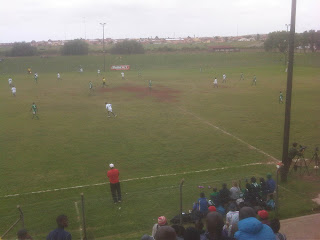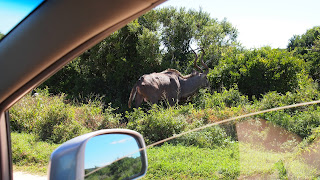Happy leap year!
Updates from last week: we had our first Xhosa lesson on Tuesday night- we have a Xhosa tutor who comes to our flat once a week for ten weeks to teach us as much as possible. It’s been a lot of fun and we’re actually beginning to pick up some of it. We are fortunate that we have our students, coworkers, and apartment security guards to practice with! Alice also labeled almost everything in the house in Xhosa, so that is an easy way to practice as well. We will do a voice recording of sorts once we feel a bit more confident in our skills.
Last Thursday, our head prefect, Melissa, took Alice and I into
the township (known as ‘location’ by the students) for the first time. We
started at her family’s home, which she calls a shack (stay tuned for a funny
story about “shacks”) because it is made of tin walls. The inside, however, was covered in drywall, was fully furnished, had electricity, a tv, a stove (which appeared nicer than ours!), and she had her own bedroom. Shows you can do a lot with a little! We met her
mother, father, and uncle who kindly welcomed us in to chat for a while. Melissa
had told her family a lot about us and we had heard a lot about them, so it was
great to meet. We had told Melissa a few weeks ago that we wanted to go to
church with her one weekend because it was such a big part of her (and many
Xhosa’s) culture, and conveniently her dad is the pastor, so we will be
attending church this Sunday. Her dad said the congregation is very
excited to have us, and it's only a short mass- 10am-2pm (what!?)- we have no idea what we are getting ourselves into. A funny
blogpost will ensue I am sure. We then walked around the township and stopped
by the home of the woman who cooks the ‘smileys’ on her block. “Smileys” are animal heads that are cooked whole, so their
teeth show and it looks like they are smiling at you. I began eating meat
before I left to try new foods here, but I can almost guarantee that will not
be one of them. We are going back to the location tomorrow with some of our
male prefects, and plan to make it a weekly occurrence to stay connected to the
community we are teaching in.
On Saturday, Alice, an American friend Scott, and I went to Jeffery’s Bay for the day. Jeffery’s Bay is a beach
town about an hour west of us on the Garden Route that is known for its
surfing. Billabong Surf Company started in Jeffery’s Bay, and holds a big surf
classic there each July. We spent the afternoon lying on the beach, got Mexican
food for lunch, and finished the afternoon watching the surfers.
 |
| My one photo of the day, the nice camera didn't get to come on this trip... |
Otherwise, teaching has been going well except that we constantly
feel frazzled by the number of classes/students we are seeing each week. We are planning a term long project for next term that is keeping us excited/motivated, but more on that later. One quick funny story about
our learners. This week we had a lesson about cultural literacy with our Grade
8s. One of the activities included looking at 4 pictures from India and
describing what they saw and what questions they had for the people who lived
there. One of the photos was of a slum comprised of shacks. As Alice and I were reading through the learner’s responses, we
kept seeing phrases like “there are lots of sharks”, “we see many sharks”. We
were quite puzzled because none of the pictures included water. We spent a lot
of time trying to understand where they thought there were sharks until I
finally came across a response that said, “and I wonder, why do they live in dirty
sharks?” We couldn’t stop laughing as we realized sharks=shacks. In our next class we made a point to explain how
to spell ‘shack’ and how difference the sentence became if spelled as ‘shark’!
Other quick updates- I have been keeping up with my running
here! I found a 5k race at the beach just down the
street from our house this upcoming weekend- so I registered for that. I
also learned that running club that is sponsoring the race is located very close to
my flat, so I have spoken with them about joining and will run with them for
the first time next week- yay for running friends! Following the race Saturday, all 13 of our prefects (grade 11 and 12 library assistants) are coming
over for lunch and a beach day that afternoon so it will be a full day!
 |
| A taste of what my morning runs looks like :) |
Some plugs: Here is the link to Alice’s blog (http://alicebator.wordpress.com/)! We have been
told our blogs complement each other nicely, so feel free to follow hers as
well for a greater sense of life here J
We have two 8th grade boys that come to the library every day to read comic books or play chess. They love to draw and are constantly asking for resources about how to become a cartoon artist. The other day they came in and asked if there was a way they could put their comics online, so Alice set up a blog for them to post their work. They have plotted out a whole story line and have posted Chapter 1 and their bios to start. If you’re up for following one more blog- check it out (http://pumlaniandisile.blogspot.com/)! It will be fun!


























